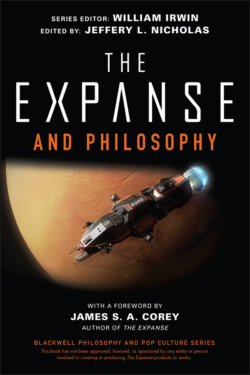Читать книгу The Expanse and Philosophy - Группа авторов - Страница 24
Does Humanity Have a Future?
ОглавлениеIn The Expanse, the future of humanity is constantly at stake. Danger comes from the protomolecule, with its uncanny capacity not only to turn every human in its path into a contagious vomit zombie, but maybe even to terraform Earth under unknown alien instructions. After Eros crashes on Venus, the protomolecule’s inscrutable activities continue, suggesting the possibility that it could destroy the entire solar system. Additionally, humanity faces the threat that the alien civilization that built the protomolecule might return. Even more worrying is the threat from whoever or whatever killed the original protomolecule makers. Most of all, though, a constant threat to humanity is all‐out war between Earth, Mars, and the Belt, culminating in the catastrophe of the Free Navy asteroid attack against Earth, killing billions of people.
Although the death of billions of people is immensely tragic, it pales in comparison to the threat to the very existence of humanity. The philosopher Derek Parfit (1942–2017) devised a thought experiment that asks us to consider three alternative scenarios:
1 Peace
2 A nuclear war that kills 99 percent of the human population
3 A nuclear war that kills 100 percent of the human population4
Everyone agrees that (b) and (c) are both much worse than (a), but Parfit’s point is that (c) is much worse than (b). In fact, he believes the greater difference lies there—the extinction of humanity is a much worse outcome than most people think.5 Extinction is not the worst just because it would mean the non‐existence of a great number of people in the future, which—assuming their lives would be worth living—would be a great loss. The loss of possible happiness of future people pales in comparison with the loss of our entire species. Human extinction would entail the loss of all possible future achievements of our species, for instance in the arts, the sciences, and in “the continued advance towards a wholly just world‐wide community.”6
Contemporary philosopher Samuel Scheffler argues that not only should we care about the future of our species, but we already do, more than we realize.7 The reason we don’t realize it is because we simply take the “collective afterlife” for granted. In fact, many of the things that we dedicate our lives to now, in the present, only make sense under the assumption that humanity will continue to exist in the future. Most of our goals and purposes in life would lose their meaning if we were to find out that we were the last generation of human beings. Scheffler believes this means that we have a deep concern for humanity, something we might even call love, which coexists with our baser impulses.
We see these conflicting motives time and again in The Expanse. Greed, selfishness, and blatant disregard for other people’s suffering are exhibited by Dresden and the Protogen corporation (in Leviathan Wakes), by Adolphus Murtry (in Cibola Burn), by Marco Inaros (in Nemesis Games), and by Admiral Winston Duarte, later High Consul of Laconia (in Persepolis Rising and Tiamat’s Wrath). Meanwhile we witness the fundamental goodness of common people, such as the crew of the Rocinante, who repeatedly risk their lives for the future of humanity.
